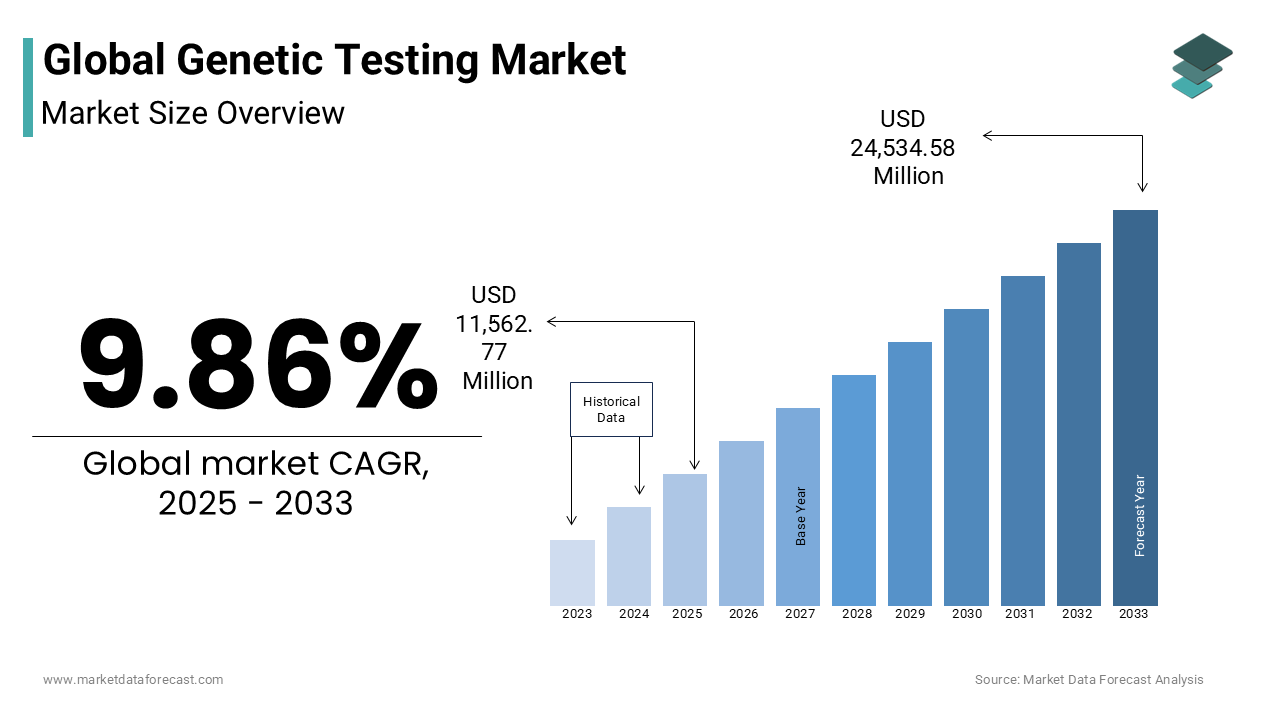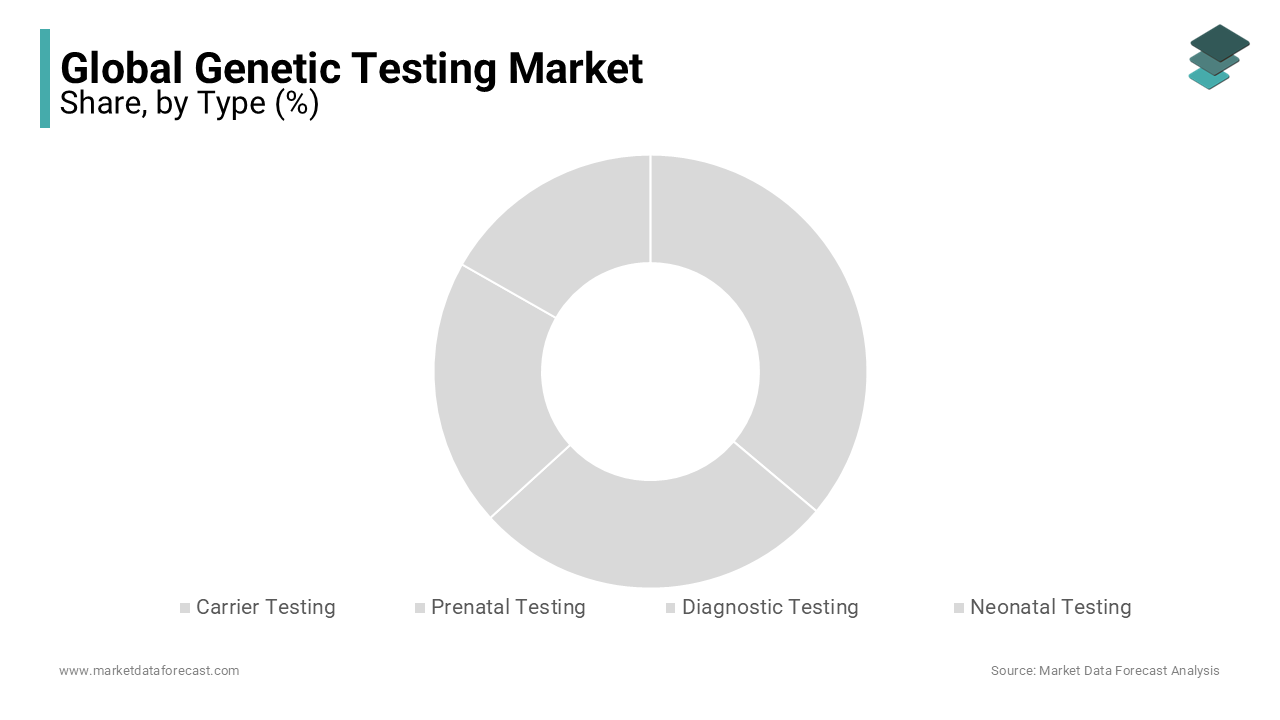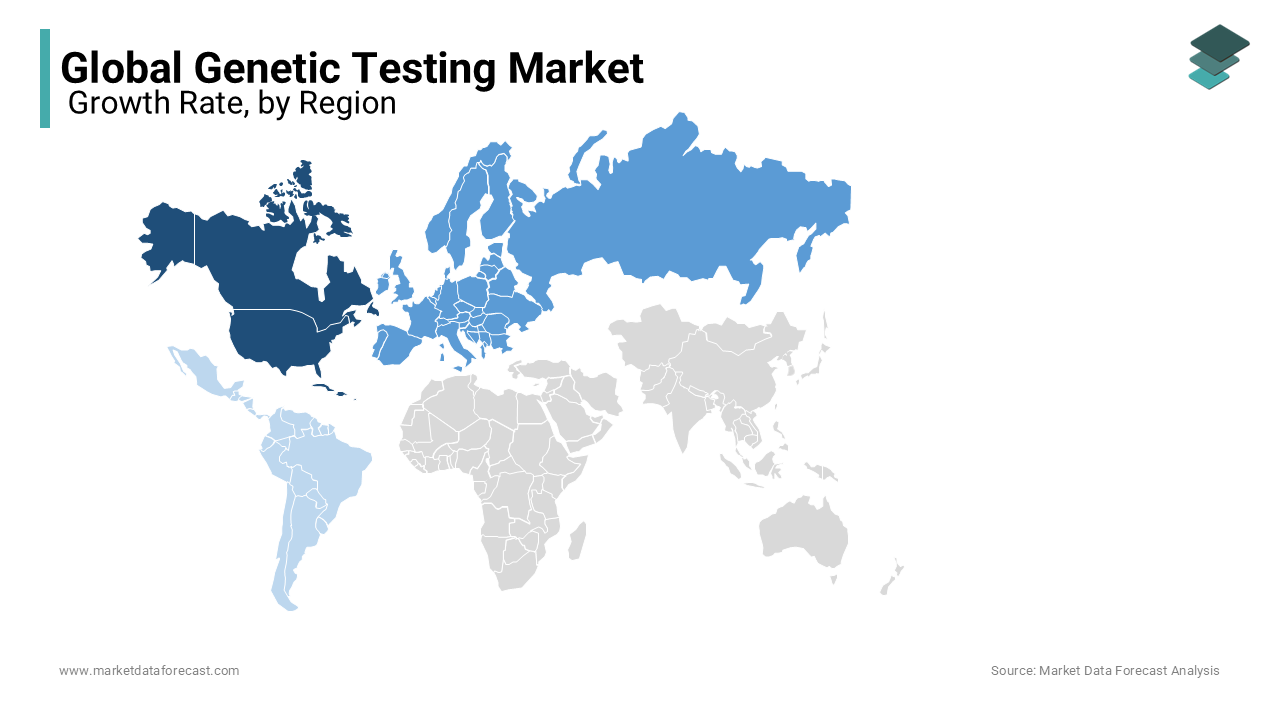Global Genetic Testing Market Size, Share, Trends & Growth Forecast Report, Segmented By Type (Carrier Testing, Prenatal Testing, Diagnostic Testing and Neonatal Testing), Application & Region (North America, Europe, Asia-Pacific, Latin America, Middle East and Africa), Industry Analysis From 2025 to 2033
Global Genetic Testing Market Size
The global genetic testing market was valued at USD 10,525.00 million in 2024. The global genetic testing market is anticipated to grow at a CAGR of 9.86% from 2025 to 2033. As a result, the global genetic testing market is forecasted to grow to USD 24,534.58 million by 2033 from USD 11,562.77 million in 2025.

Current Scenario of Global Genetic Testing Market
Genetic testing is the medical test method that evaluates the cells or tissues of a person to detect the changes in their DNA, genes, proteins, or chromosomes. These changes are known as mutations or variants that indicate a disease condition. Genetic testing helps evaluate the hereditary passage of the disease to the children or family members. The global genetic testing market has witnessed prominent growth in the past years and is projected to have notable growth with a significant growth rate during the forecast period. Genetic testing possesses a number of advantages as it is helpful in the diagnosis and treatment planning of cancer, screening newborn babies, and monitoring the treatment. The genetic testing accuracy depends on the type of condition being tested, and it may not be able to detect all the genetic mutations or defects. The escalation in no logical advancements, expanding R&D activities, and oneness of innovative and novel treatments are a few primary factors contributing to the market expansion.
MARKET DRIVERS
The growing demand for personalized medicine is propelling the genetic testing market growth.
The usage of genetic testing to develop personalized medicine by studying the genetic makeup of patients has increased significantly in recent years. In genetic testing, the DNA of an individual will be tested and their genetic variations, to evaluate the possibilities for genetic diseases and develop appropriate personalized treatment plans. Personalized treatment plans are believed to more effective and offer improved health outcomes to patients. Likewise, the growing usage of personalized medicine is resulting in the increased usage of genetic testing and contributing to market growth due to the critical role that genetic testing plays in the development of personalized medicine.
- As per the survey conducted by the American Medical Association, an estimated 92% of physicians have agreed that they have been using genetic testing to inform decisions and 80% believed that the importance and application of genetic testing are going to increase in the coming years.
The growing prevalence of genetic diseases is contributing to the expansion of the genetic testing market.
The growing patient population suffering from genetic diseases has been promoting the demand for genetic testing to identify and manage these conditions.
- WHO says an estimated 400 million people worldwide suffer from genetic diseases, which is approximately 1 in 17 people.
With the growing number of technological developments in genetic sequencing technologies, such as next-generation sequencing, genetic testing services have become more accessible and affordable. In recent years, the usage of next-generation sequencing has increased dramatically due to its benefits, such as faster and more accurate analysis of genetic information. The awareness among healthcare providers and people about genetic testing and its potential benefits has increased significantly over the last few years and the trend is continues further in the coming years and drive the genetic testing market growth.
In addition, the growing number of initiatives and funding by the governments of several countries for the research and development of genetic testing favors the market’s growth rate. In recent years, the adoption of direct-to-consumer genetic testing has grown significantly due to the growing willingness of consumers to learn more about their ancestry and genetic makeup and this trend is likely to continue in the coming years and support the market’s growth rate. The growing usage of genetic testing in sports medicine and the assessment of genealogical relationships is anticipated to boost the growth rate of the genetic testing market during the forecast period. The rising demand for prenatal testing is adding fuel to the growth of the genetic testing market. The expectant parents are showing interest these days in learning about genetic abnormalities and making informed decisions about the health of their unborn child and likewise contributing to the market growth.
Furthermore, the growing demand for early disease detection, rising emphasis on precision medicine, an increasing number of advancements in gene editing technology, increasing availability of genetic data, and rising demand for pharmacogenomics have provided a boost to the growth rate of the genetic testing market. Factors such as the increasing adoption of genetic testing in oncology research and increasing demand for ancestry testing favor market growth.
MARKET RESTRAINTS
High costs associated with genetic testing are one of the major factors restraining the market growth.
The lack of skilled persons to analyze the reports due to a smaller number of training institutes is a considerable restraint to the genetic testing market. Furthermore, genetic testing equipment in laboratories needs maintenance and regular inspection to have accurate results, which requires lots of investments to inhibit the global genetic testing market's growth rate. Furthermore, lack of standardization in maintaining appropriate procedures in testing and growing concern towards the authentication of genetic reports where people demand privacy and security are further damaging the acceleration of the market. Stringent rules and regulations by higher authorities in approving new products, significantly improving genetic testing services, are also declining the growth of the global genetic testing market.
REPORT COVERAGE
|
REPORT METRIC |
DETAILS |
|
Market Size Available |
2024 to 2033 |
|
Base Year |
2024 |
|
Forecast Period |
2025 to 2033 |
|
Segments Covered |
By Type, Application, and Region |
|
Various Analyses Covered |
Global, Regional & Country Level Analysis, Segment-Level Analysis, Drivers, Restraints, Opportunities, Challenges; PESTLE Analysis; Porter's Forces Analysis, Competitive Landscape, Analyst Overview of Investment Opportunities |
|
Regions Covered |
North America, Europe, Asia Pacific, Latin America, Middle East & Africa |
|
Market Leader Profiled |
Abbot Laboratories, Roche Molecular Diagnostics, Inc., Abbott Molecular Inc., Auto Genomics, Inc., Celera Group, ELITech Group, BioRad Laboratories, PerkinElmer Inc., Roche Diagnostics Corp., Quest Diagnostics Inc., Transgenomic Inc., and Applied Biosystems, Inc. |
SEGMENTAL ANALYSIS
By Type Insights
The carrier testing segment accounted for the largest global genetic testing market share in 2024. The domination of the carrier testing segment is primarily attributed to the growing patient population suffering from genetic disordersn increasinf advancements in genetic testing technologies, and the rising accessibility and affordability of carrier testing. In addition, the growing awareness among people and healthcare professionals regarding the potential benefits of carrier testing, the increasing number of favorable government initiatives and the growing number of genetic testing laboratories boost the growth rate of the segment.

The prenatal testing segment had a substantial share of the worldwide genetic testing market in 2024. The growth of the segment is primarily driven by the rising awareness of genetic disorders among people and the growing number of advancements in non-invasive prenatal testing (NIPT) technology. The incidence of genetic disorders increases with the growing preference towards delaying pregnancy from women, which results in the growing demand for prenatal testing and contributes to segmental growth. Several governments' growing number of favorable initiatives favoring prenatal testing favors segmental growth.
- For instance, prenatal testing services are available at zero cost in the UK and this initiative was taken by the National Health Service (NHS). The growing number of prenatal testing laboratories worldwide is further supporting the growth rate of the segment.
The diagnostic testing segment is predicted to register a notable CAGR during the forecast period. Due to recent technological advancements, diagnostic testing has become more accurate and affordable, and due to this, the adoption of genetic testing has increased significantly for diagnosis and treatment needs and is driving segmental growth. The growing demand for personalized medicine and the increasing need for direct-to-consumer genetic testing further propel the segmental growth.
By Application Insights
Based on the application, the cancer testing segment is predicted to grow at a promising CAGR during the forecast period owing to the growing number of cancer patients and rising expenditure on healthcare. The growing usage of technologically well-advanced genetic testing technologies, such as next-generation sequencing and liquid biopsy, for the diagnosis and treatment of cancer, is primarily driving segmental growth. Increasing efforts from the governments to promote the usage of genetic testing for cancer treatment procedures and growing usage of genetic testing for the development of personalized medicine further fuelling the segment’s growth rate.
REGIONAL ANALYSIS
North America led the genetic testing market worldwide in 2024.

There are higher chances for the North American region to continue its domination in the coming future. The growth of North American is attributed to the growing patient count suffering from genetic disorders, the rising adoption of direct-to-consumer genetic testing, and the presence of key market participants. In addition, an increasing number of initiatives from the governments of North American countries in favor of genetic testing and rapid adoption of technological developments in genetic testing boost the regional market. The U.S. market accounted for the most significant share of the North American market in 2024, followed by Canada. The growing use of personalized medicine increases DNA testing in developed regions such as the U.S. Increasing personalized medicine for some treatments improves the recovery rate from disease among many patients. Personalized medicine is used for various chronic diseases such as heart disease, cancer, diabetes, etc. Genetic testing on a person developing personalized medicine makes it easy for the drug developer to recover the patient fast from the illness.
Europe held the second-biggest share of the global market in 2024.
Factors such as the growing demand for effective treatment procedures and growing awareness of the prevention of diseases through DNA information from ancestry and increasing support from the government in introducing reimbursement schemes in favor of people drive the genetic testing market in Europe. The UK captured the major share of the European market in 2023. The German genetic testing market is predicted to witness a healthy CAGR in the coming years and occupies a substantial share of the European market during the forecast period.
Asia-Pacific is one of the most lucrative regional markets for genetic testing worldwide.
The rapid growth of the Asia-pacific region in the worldwide market is majorly attributed to the growing aging population, increasing healthcare expenditures, and rising awareness of genetic testing. China and Japan are predicted to hold the major share of the APAC market during the forecast period.
Latin America is a noteworthy regional segment in the global market.
An increase in the number of advancements in the healthcare infrastructure and the growing number of people suffering from genetic disorders in Latin American countries contributes to the genetic testing market expansion in the Latin American region. Brazil, followed by Mexico, are predicted to account for the leading share of the Latin American market during the forecast period.
KEY PLAYERS IN THE GLOBAL GENETIC TESTING MARKET
Some of the prominent companies leading the global genetic testing market profiled in this report are Abbott Laboratories, Roche Molecular Diagnostics, Inc., Abbott Molecular Inc., Auto Genomics, Inc., Celera Group, ELITech Group, BioRad Laboratories, PerkinElmer Inc., Roche Diagnostics Corp., Quest Diagnostics Inc., Transgenomic Inc., and Applied Biosystems, Inc.
Abbott Laboratories, a market leader in the genetic testing market, operates in many areas, including established medicine, nutrition, diagnostics, cardiovascular, and neuromodulation, and is headquartered in the US. In May 2019, the corporation announced WHO pre-approval of the world's first point-of-care viral load test, m-PIMA HIV-1 / 2 VL. The company's main products include chromosome enumeration probes, FISH accessories, and prenatal.
RECENT HAPPENINGS IN THE MARKET
- In February 2024, Sysmex Corporation and Hitachi High-Tech Corporation announced their collaboration to develop genetic testing systems that use capillary electrophoresis sequencers (CE sequencers). The primary aim of the collaboration is to enhance the company’s position in the genetic testing industry by escalating its outreach.
- In July 2023, Quest Diagnostics launched its first consumer-initiated genetic test, Genetic Insights. This new launch is expected to help people understand the potential risks associated with developing various inheritable health conditions. This test is incorporated with advanced technology and end-to-end support, providing genetic counselling access.
- In March 2022, Illumina, a genome sequencing group, launched a cancer test in Europe that evaluates the presence of various tumor genes in a single tissue sample. This initiative is expected to help patients with treatment plans for rare disease conditions.
- In January 2020, Quest Diagnostics (USA) Clinical Laboratory announced that Finnish genetic testing company Blueprint Genetics would increase next-generation sequencing capabilities for rare diseases. Blueprint Genetics is actively engaged in interpreting genetic variants by expanding its presence within the US market and sequencing next-generation bioinformatics technologies. Quest is one of the essential laboratory testing companies globally and is currently specializing in improving next-generation sequencing capabilities. The acquisition will allow Quest to boost genetic testing for rare genetic disorders.
DETAILED SEGMENTATION OF THE GLOBAL GENETIC TESTING MARKET INCLUDED IN THIS REPORT
This research report on the global genetic testing market has been segmented and sub-segmented based on type, application and region.
By Type
- Carrier Testing
- Prenatal Testing
- Diagnostic Testing
- Neonatal Testing
By Application
- Cancer Testing
- Pharmacogenomics Testing
- Prenatal Testing
- Predisposition Testing
By Region
- North America
- Europe
- Asia-Pacific
- Latin America
- The Middle East and Africa
Frequently Asked Questions
who are the key players of the global genetic testing market ?
The global genetic testing market key market players profiled in this report are Abbott Laboratories, Roche Molecular Diagnostics, Inc., Abbott Molecular Inc., Auto Genomics, Inc., Celera Group, ELITech Group, BioRad Laboratories, PerkinElmer Inc., Roche Diagnostics Corp., Quest Diagnostics Inc., Transgenomic Inc., and Applied Biosystems, Inc.
Which Region holds the largest revenue share during the forecast period in the global genetic testing market?
The North American genetic testing market is expected to grow significantly and hold the largest revenue share during the forecast period.
what is the compound annual growth rate (CAGR%) of the global genetic testing market during the forecast period?
The global genetic testing market is expected to grow at a CAGR of 9.86% during the forecast period.
Related Reports
Access the study in MULTIPLE FORMATS
Purchase options starting from
$ 2500
Didn’t find what you’re looking for?
TALK TO OUR ANALYST TEAM
Need something within your budget?
NO WORRIES! WE GOT YOU COVERED!
Call us on: +1 888 702 9696 (U.S Toll Free)
Write to us: sales@marketdataforecast.com
